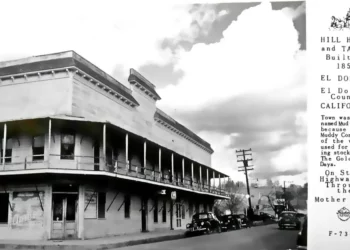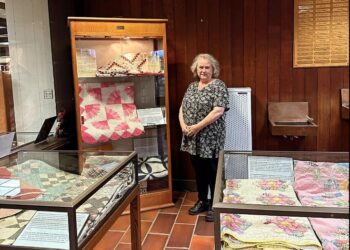Pilot Hill, Calif. (November 28, 2023) – Born on October 16th, 1827, in the picturesque town of Athens, Windham County, Vermont, Alcander John Bayley emerged as the youngest of three sons from the lineage of James and Mercy Bayley. His father, a merchant, and his mother, both born in Vermont, instilled in him a spirit of exploration and enterprise.
Young Bayley’s journey into the Western States began after graduating from Townsend Academy at the age of sixteen. In 1848, fueled by the allure of the gold rush in California, he embarked on a journey to Brunswick, Missouri, and eventually to Leavenworth, Kansas. However, the call of the golden opportunities in California proved irresistible, leading Bayley to organize a company that purchased the ship Edward Everett.
Setting sail on January 11th, 1849, the ship reached San Francisco bay on July 6th of the same year. In the nascent town that would later become the bustling metropolis of San Francisco, Bayley and his company quickly secured teams and ventured to the Mokelumne River mines. The mining venture, however, disbanded, prompting Bayley to explore Hangtown and Coloma mining districts.
Returning to Sacramento, he opened a storage house in October 1849, marking the beginning of his varied entrepreneurial pursuits. In March 1850, Bayley took charge of the Winters’ Hotel in Coloma, marrying Miss Elizabeth Jones in a historic ceremony on July 25th, 1850.
In the early 1850s, Alcander John Bayley, affectionately known as A. J. Bayley, emerged as a trailblazer in the agricultural landscape of El Dorado County. Venturing into large-scale general farming around 1851 or 1852, he made history by becoming the first in the county to embrace modern farming machinery such as reapers and mowers, along with a groundbreaking threshing machine.
Amidst his various endeavors, A. J. Bayley found time to engage in the hospitality industry. He tended bar at the Winters Hotel, showcasing his versatility and community involvement.
The introduction of the first mower to Pilot Hill in the 1850s was not without its challenges. Delivered in pieces for easier shipment, the unfamiliar sight posed a conundrum for locals unaccustomed to the intricacies of the machinery. A. J. Bayley faced the task of assembling the mower, encountering issues with the sicklebar. Undeterred, he sent the machine back to Sacramento to ensure it was assembled correctly, marking a testament to his commitment to progress and efficiency in agriculture.
In subsequent years, A. J. Bayley continued to be at the forefront of technological advancements in farming. He acquired the first threshing machine in the county, a noteworthy feat given the recent completion of the railroad from Sacramento to Auburn. During the journey to bring the machine home, onlookers unfamiliar with such innovations mistook it for a circus bandwagon, highlighting the novelty of this technological marvel.
Beyond his contributions to agriculture, A. J. Bayley took on civic responsibilities. In 1854, he served as Supervisor No. 9, overseeing the road from Uniontown bridge to Oregon Bar. His commitment to the community extended to the establishment of the first Grange in California, the Pilot Hill Grange, organized on August 10th, 1870. As the Secretary of the Grange, he played a pivotal role in its early success.
A. J. Bayley’s influence also extended into the realm of politics. In the general election of September 6th, 1871, he secured a resounding victory as a member of the State Assembly, garnering 1,554 votes. His political journey continued into the general election of November 7th, 1882, reflecting the enduring support he enjoyed within the community.
In the educational realm, Bayley contributed to the founding of the first school in the Pilot Hill School District. Supported by Bayley and others, this private school, taught by Mrs. Alice Galloway, reflected the community’s commitment to education.
In September, 1850, he resigned his position in the hotel at Coloma and erected a hotel at Pilot Hill.
The year 1851 witnessed Bayley’s entrepreneurial acumen as he erected the Oak Valley House, a hotel in Pilot Hill.
“COTILLON PARTY”
To be given at A. J. Bayley’s Oak Valley House, Thursday evening, November 27th, 1851
Managers Robert H. West, John C. Barr, Hon. V. Daniels, Hon. W. F. Stewart, Wm. R. Hopkins, Dr. D. A. Cohea, John Orr and Hon. Judge Thomas”.
The first ball given in the new hall was on the 19th of October, 1854, to which 156 tickets were sold at $10.00 each, and one hundred and forty ladies present. The total receipts of this party was $2,200. The last annual ball was given by Mr. Bayley on the evening of October 25th, 1860, at which the receipts were $1,500.
When the building was enlarged it contained a hall 96×30 feet, hard finished and covered with fresco paper, and adjoining it was a dining room the same length and twenty feet wide. The grand opening ball held on November 27-28th, 1851, marked the start of a successful venture, propelling him to expand the establishment known as the Oak Valley House; when completed he gave an opening ball which continued for two days, November 27-28th, 1851, and upon counting his cash found that he was $3,500 ahead. This stimulated him to go on and enlarge his hotel. A copy of the invitation.
Bayley’s resilience was tested in 1861 when his hotel, along with all its contents, succumbed to a devastating fire.
Undeterred, he embarked on constructing his grand residence, a three-story brick mansion, which stands as the largest in the county. His palatial brick residence, the largest in the county, containing about three hundred thousand brick and costing $20,000.
It is three full stories in height. The opening reception was on May 15th, 1862. The residence located on his beautiful Oak Valley ranch of 640 acres, forty miles from the capital of the State and eight miles from Coloma and Auburn each.
In Centerville, the old town of Pilot Hill, was a testament to Bayley’s impact. His ranch, adorned with a magnificent three-story brick mansion erected in 1860, stood as a lasting symbol of architectural excellence in El Dorado County.
From this vantage point on his Oak Valley ranch, Bayley enjoyed sweeping views of the Sacramento and Coloma valleys. His residence, completed in 1862, reflected unparalleled construction and finish, boasting a double piazza supported by eight large pillars.
Beyond his achievements in hospitality, Bayley made significant contributions to agriculture in El Dorado County. Engaging in general farming from 1851, he became the first in the county to utilize advanced farming machinery such as reapers and mowers. His commitment to progress extended to being the proud owner of the first threshing machine in the county.
Bayley’s influence extended to civic engagement, as evidenced by his role as Supervisor in No. 9 in 1854 and his instrumental role in organizing the first Grange in California in 1870.
Politically, Bayley made his mark as the Democratic nominee for the Assembly in 1871, emerging as the sole victor on the ticket. His political journey continued with an assembly bid in 1882, reflecting his enduring commitment to public service.
Family life flourished for Bayley, with four children born to him and his wife, Elizabeth. Alonzo A., James P., Jennie E., and Ida M. formed a family that thrived through constant toil and economic prudence.
In the annals of El Dorado County history, Alcander John Bayley stands as a testament to the indomitable spirit of the pioneers who shaped the American West. His legacy lives on in the resplendent brick mansion overlooking the Oak Valley [1883], a symbol of enduring achievement in the face of challenges and change.

![Bayley Residence, Pilot Hill [Centerville]](http://www.inedc.com/23/wp-content/uploads/2023/11/Bayley-Res-750x375.webp)
![Grizzly Flat [ca. 1851-1852]](http://www.inedc.com/23/wp-content/uploads/2023/11/GrizzlyFlats-1851-1852-120x86.webp)

![Grizzly Flat [ca. 1851-1852]](http://www.inedc.com/23/wp-content/uploads/2023/11/GrizzlyFlats-1851-1852-350x250.webp)





